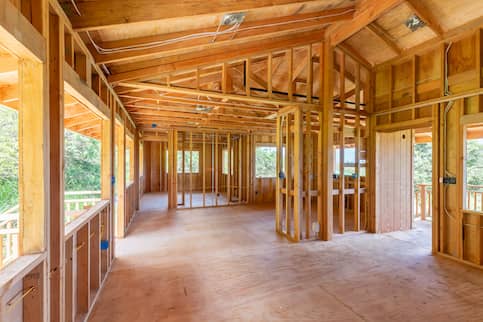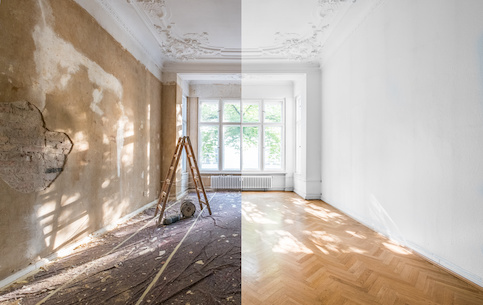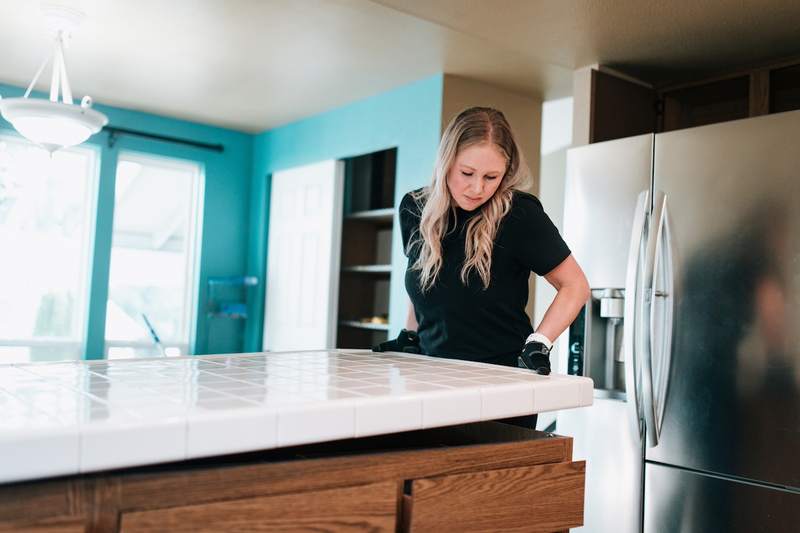If your military service qualifies you for Veterans Affairs benefits, you probably know you can use a VA loan to buy a home. What you may not know is that those benefits also include a VA construction loan that you can use to buy land and build your own home.
Read on to learn more about how VA construction loans work, how to get one, and the pros and cons of this mortgage type.
What Is A VA Construction Loan?
You can use a VA construction loan to buy, build and pay off a home. If you need a loan to buy land, this may require up to three loans.
The VA doesn’t offer construction loans outright. Instead, it insures loans that approved private lenders make to qualified borrowers.
See What You Qualify For
Buy A Home
Discover mortgage options that fit your unique financial needs.

Refinance
Refinance your mortgage to have more money for what matters.
Tap Into Equity
Use your home’s equity and unlock cash to achieve your goals.
How Does A VA Construction Loan Work?
A VA construction loan disburses money in installments as you build your home. Each installment is called a draw and pays for a specific phase of construction.
As part of the process, a VA home appraiser will look at the property to determine the fair market value. This helps the home buyer and the lender make sure that the amount they lend isn’t over the home’s value.
The closing process will take 45 to 60 days, and you’ll receive money in an escrow account, disbursed based on project benchmarks as needed. The home will need to pass a final VA inspection upon completion.
Land Loans
VA land loans are available if you need a loan to buy land to build your home.
The VA only offers land loans in conjunction with home construction loans, and borrowers must plan to begin construction as soon as possible. VA land loans also restrict the types of parcels that can qualify.
Some VA-eligible borrowers may already own the land they want to build on or prefer to buy land without a VA loan because of how long it takes to get a VA construction loan.
One-Time Close Loans
A one-time close loan pays for both the construction of the home and the home itself. The lender establishes the financing before construction, and the terms become permanent at the end of the building process.
Ultimately, you’ll have a traditional mortgage that you pay off monthly. The convenience is attractive, but getting all the pieces to fall into place promptly can be challenging.
Two-Time Close Loans
This option involves two separate loans. The first loan is short-term and finances the cost of construction. It closes before construction begins.
Once the home is complete, you transition the loan into a permanent VA loan, typically through a refinance.
If the home and the property can pass VA appraisal standards, this route might be quicker and easier.
How To Get A VA Construction Loan
Let’s look at an example of how to get a VA construction loan.
- Make Sure You Qualify
First, you must qualify for the loan by getting a Certificate of Eligibility. The COE confirms you meet minimum service requirements, which depend on your branch, service time and status. Veterans with disabilities may be eligible for additional housing grants, financial waivers and tax benefits.
- Buy The Land
Next, you can buy the land you plan to build your house on. Keep in mind the land must meet local and national VA requirements. These may include:
— Year-round access to the home.
— Free of natural hazards, including sinkholes, flood zones and environmental contamination.
— Safe and potable water access and safe sewage disposal.
Proper drainage. - Find An Approved Lender
Not all lenders that offer VA loans offer VA construction loans. This might be the most challenging part of the process as you may find it difficult to find a lender that provides both loan types.
You can contact a regional VA center to learn about the services provided in your state. - Get Mortgage Preapproval
You’ll want to apply for mortgage preapproval, which means you’ll submit your financial information and the lender will estimate how much of a loan it expects you to qualify for. They’ll look at financial documents, including pay stubs and bank statements, COE, tax returns and investment account information. You’ll also undergo a hard credit check.
The risk of a home loan to purchase an existing home is compounded by the risks inherent in home construction. Stricter requirements may be imposed on home builders.
Individual Credit Requirements
The VA itself doesn’t set credit requirements for VA loans. Private lenders who offer VA construction loans all set their own requirements. When evaluating you for a loan, lenders will consider:
— Credit score: The minimum credit score that lenders will consider is typically around 580 for a VA loan. You may be able to qualify with a lower credit score, depending on your situation and lender.
— Debt-to-income ratio: Your DTI ratio shows how much of your gross monthly income is taken up by debt payments. The minimum DTI ratio requirement may be around 41%, but check with your lender about your criteria.
— Residual income: VA residual income refers to income left over after you pay all major expenses. In other words, it helps your lender decide whether you have money left over after taking care of daily expenses. A VA residual income limit depends on where you purchase your property. - Building Plans And Property Review
In addition to meeting specific requirements for eligibility, your building plans also must be approved. Once you’re preapproved, you’ll need to submit your construction plans to your lender for an initial appraisal. This may include descriptions of the layouts and planned materials for the home.
Again, the land and the new construction must meet property requirements, which are applied across all VA home loans. - Find A Registered Contractor
Next, you’ll need to find a VA-registered contractor willing to work under the VA oversight and payment terms. The builder must have a valid builder identification number for the proposed construction.
Explore the VA loan information hub to find registered builders and answers to other VA loan questions you may have. Note that you cannot perform the work yourself. If you move forward with a private loan and complete the work yourself, the VA may authorize a traditional mortgage to pay off the construction loan if the home meets its appraisal standards. - Close On The loan
Closing on your construction typically takes 45 to 60 days. Once complete, your lender will fund the loan through draws that release funds as needed to complete the next phase of construction. The remainder is deposited into an escrow account to be withdrawn as needed.
- Pass Inspection
Once the build is complete, it must pass a VA inspection. If you have a one-time close loan, your construction loan will become a permanent mortgage loan. A two-time close loan will require repayment of the construction loan and a permanent mortgage to buy the home, which often is done by refinancing the construction loan into a new mortgage.
Pros And Cons Of VA Construction Loans
Look at the pros and cons of building a house funded by VA loans before deciding if it’s the right option for you.
Pros
Loan benefits include a low down payment, lenient credit requirements, low interest rates, and closing costs that can be rolled into the loan.
No Or Low Down Payment
You can get a VA construction loan with no down payment required. However, it may depend on your lender, credit score and financial situation. You will be required to pay a funding fee unless you’re exempt.
Lenient Credit Requirements
VA loans are generally easier to get approved, with a lower credit score requirement than other construction loans and a higher allowable debt level. Note that lenders are free to set their own requirements for a VA construction loan.
Low Interest Rates
You can typically get a VA loan for a slightly lower interest rate than a conventional loan. However, your lender will consider your entire profile, including your credit score, DTI ratio and residual income.
Closing Costs Can Be Rolled Into The Loan
You may be able to roll some VA closing costs into your loan. On average, closing costs typically total 2% to 5% of the purchase price.
Your specific closing costs depend on your loan type and location. When you roll your closing costs into your loan, you push your closing costs into the mortgage, which creates a larger loan amount. That means you may pay more total interest over the life of the loan and have higher monthly loan payments.
One-Time Upfront Funding Fee
One of the requirements of a VA loan is the upfront funding fee, a typical fee requirement that borrowers may need to pay to help financially support and sustain the home loan program. Some individuals may not have to pay a VA funding fee, particularly if they have a VA-approved disability.
If you have a single-close loan, you must pay the funding fee within 15 days of closing. For a two-time close loan, you must pay the funding fee within 15 days of the permanent closing.
Cons
Before you commit to building a home, it’s important to consider the cons of this type of construction loan.
Finding a Lender
Finding a lender offering a VA construction loan and VA purchase loan may require more time.
Construction Loan Risks
A few risks are inherent in construction loans, including following all requirements and area regulations. There’s also choosing a contractor that meets VA qualifications and getting the right qualifications for preapproval.
The construction draw process also presents challenges because every stage of the construction project must be considered. Monitoring progress and getting a final appraisal can also be time-consuming or present difficulties.
Once the home is built, it must pass the VA inspection, which could also present challenges.
Slow Progress
Delays can occur when dealing with federal bureaucracy. You should plan for delays you might encounter, such as extra paperwork during the loan approval process, particularly with a VA construction project.
Enhanced Oversight Of The Process
The VA retains oversight of the project during the construction phase, which can cause issues between the homeowner, the contractor and the VA’s representative.
FAQ
Here are answers to some common questions about VA construction loans.
The Bottom Line
Due to restrictions and possibly limited access to these loans, you may find it challenging to build a home solely using a VA construction loan. However, if a new home is important to you, VA construction loans are available to you as a qualifying military member, veteran or eligible surviving spouse.
Guide To VA Loans
Discover a more affordable loan option for United States veterans, service members and spouses.

Melissa Brock
Melissa Brock is a freelance writer and editor who writes about higher education, trading, investing, personal finance, cryptocurrency, mortgages and insurance. Melissa also writes SEO-driven blog copy for independent educational consultants and runs her website, College Money Tips, to help families navigate the college journey. She spent 12 years in the admission office at her alma mater.












